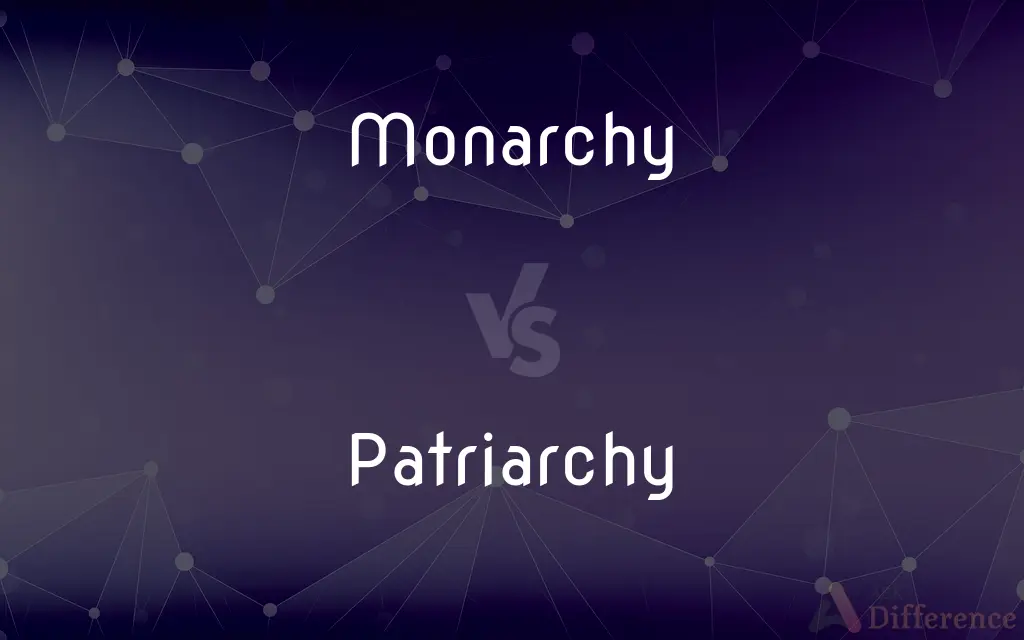Monarchy vs. Patriarchy — What's the Difference?
By Tayyaba Rehman — Updated on September 25, 2023
Monarchy is a form of government where a single person rules as head, usually a king or queen, whereas patriarchy is a social system in which males hold primary power.

Difference Between Monarchy and Patriarchy
Table of Contents
ADVERTISEMENT
Key Differences
Monarchy and Patriarchy are terms representing distinct concepts, each with its implications and applications. Monarchy is a form of governance where a single individual, typically a king or queen, rules as the head of the state, often inheriting the position. It is a political system characterized by the centralization of power and is usually hereditary. Monarchy is focused on the organization of political and state power, often with a defined set of laws and governance structures to manage the societal and administrative aspects of a nation.
Patriarchy, in contrast, is a social system in which males hold primary power, dominating in roles of political leadership, moral authority, and control of property. It is not a form of government but rather a societal structure where men have authority over women and children. Patriarchy is evident in various aspects of society, including familial structures, societal norms, and institutional frameworks, impacting the roles, rights, and opportunities available to different genders.
While Monarchy is about the concentration of political power in the hands of one individual or a royal family, Patriarchy pertains to the predominance of men in societal roles and structures. Monarchy is more about the constitutional and administrative arrangement of a country or a region, defining the way a society is governed and managed. It revolves around political authority and statecraft, impacting the enactment of laws, administration of justice, and management of public affairs.
In contrast, Patriarchy is concerned with societal norms and traditions that dictate gender roles and relationships. It is embedded in cultural, social, and institutional norms, influencing the distribution of rights, responsibilities, and opportunities among genders. It shapes interpersonal relationships, societal attitudes, and cultural values, determining the dynamics between men and women in various spheres of life.
In conclusion, Monarchy and Patriarchy are fundamentally different, with the former being a political system characterized by singular leadership, usually hereditary, and the latter being a societal structure where men predominantly hold power and authority.
ADVERTISEMENT
Comparison Chart
Definition
A form of government with a single ruler
A social system where males hold primary power
Scope
Political and Administrative
Societal, Cultural, and Familial
Power Structure
Centralized in one individual or a royal family
Males dominate in roles of leadership and moral authority
Impact
Determines governance and laws of a nation
Influences societal norms, gender roles, and relationships
Representation
Represents a political system
Represents a societal structure
Compare with Definitions
Monarchy
A state or nation where the head of state is a monarch.
Saudi Arabia is an absolute monarchy where the king has extensive powers.
Patriarchy
A system where men have authority over women and children in a family.
The notion of patriarchy is evident in familial structures where the father is the primary authority figure.
Monarchy
The territory ruled by a single monarch.
The monarchy was prosperous under the wise and just rule of the benevolent king.
Patriarchy
A cultural and social system where males are the primary authority figures.
Feminist movements challenge the norms and values established by patriarchy.
Monarchy
Governance structure with a sovereign individual, usually a king or queen.
In a monarchy, the ruling monarch's powers may be restricted by law or constitution.
Patriarchy
The dominance of men in social, economic, and political spheres.
Patriarchy has been a significant barrier to women’s progress and equality in many societies.
Monarchy
A monarchy is a form of government in which a person, the monarch, is head of state for life or until abdication. The political legitimacy and authority of the monarch may vary from restricted and largely symbolic (constitutional monarchy), to fully autocratic (absolute monarchy), and can expand across the domains of the executive, legislative, and judicial.
Patriarchy
Roles of leadership.
Many societies are moving away from patriarchy and embracing gender equality.
Monarchy
Government by a monarch.
Patriarchy
Social organization marked by the supremacy of the father and the men in the family.
Patriarchy often influences the distribution of responsibilities within a family.
Monarchy
A state ruled or headed by a monarch.
Patriarchy
Patriarchy is a social system in which men hold primary power and predominate in roles of political leadership, moral authority, social privilege and control of property. Some patriarchal societies are also patrilineal, meaning that property and title are inherited by the male lineage.
Monarchy
A government in which sovereignty is embodied within a single, today usually hereditary head of state (whether as a figurehead or as a powerful ruler).
An absolute monarchy is a monarchy where the monarch is legally the ultimate authority in all temporal matters.
A constitutional monarchy is a monarchy in which the monarch's power is legally constrained, ranging from where minor concessions have been made to appease certain factions to where the monarch is a figurehead with all real power in the hands of a legislative body.
Patriarchy
A social system in which the father is the head of the family.
Monarchy
The territory ruled over by a monarch; a kingdom.
Patriarchy
A family, community, or society based on this system or governed by men.
Monarchy
A form of government where sovereignty is embodied by a single ruler in a state and his high aristocracy representing their separate divided lands within the state and their low aristocracy representing their separate divided fiefs.
Patriarchy
Dominance of a society by men, or the values that uphold such dominance.
Monarchy
States based on a system of governance headed by a king or a queen.
Patriarchy
The collection of men in positions of power, exerting such dominance. In all senses also called patriarchate.
Monarchy
A state or government in which the supreme power is lodged in the hands of a monarch.
Patriarchy
A social system in which the father is head of the household, having authority over women and children, and in which lineage is traced through the male line.
Monarchy
A system of government in which the chief ruler is a monarch.
In those days he had affected zeal for monarchy.
Patriarchy
A power structure in which men are dominant.
Monarchy
The territory ruled over by a monarch; a kingdom.
What scourage for perjuryCan this dark monarchy afford false Clarence.
Patriarchy
(Christianity) The office of a patriarch; a patriarchate.
Monarchy
An autocracy governed by a monarch who usually inherits the authority
Patriarchy
The jurisdiction of a patriarch; patriarchship.
Monarchy
A political system where a single person, usually by hereditary right, rules as head of state.
The United Kingdom is a constitutional monarchy with the monarch having a ceremonial role.
Patriarchy
Government by a patriarch; patriarchism.
Monarchy
A form of government characterized by single-person rule.
Historically, many regions were ruled by monarchies with varying degrees of power.
Patriarchy
A form of social organization in which a male is the family head and title is traced through the male line
Common Curiosities
Is a Monarchy a form of government?
Yes, Monarchy is a form of government where a single person, usually a king or queen, rules as the head of state.
Can a Monarchy exist within a democratic system?
Yes, constitutional monarchies operate within democratic systems where the monarch's powers are limited by law or constitution.
Can Patriarchy exist in matriarchal societies?
A matriarchal society, where women hold primary power, is considered the opposite of a patriarchal society, but elements of patriarchy can still exist.
Does Patriarchy only refer to family structures?
No, Patriarchy refers to any social system where men hold primary power and dominate in roles of leadership, not just in families.
Is Patriarchy inherently oppressive to women?
Patriarchy, by its definition, does place men in positions of power and can lead to the oppression and subjugation of women.
Does the ruler in a Monarchy have unlimited power?
In an absolute monarchy, the ruler has almost unlimited power, but in a constitutional monarchy, their powers are limited by law or constitution.
Is Monarchy always hereditary?
While many monarchies are hereditary, some have other methods of succession, such as election.
Can Patriarchy be dismantled?
Yes, through societal, legal, and cultural changes, structures of patriarchy can be dismantled and replaced with more egalitarian systems.
Share Your Discovery

Previous Comparison
Trash vs. Garbage
Next Comparison
Thriller vs. HorrorAuthor Spotlight
Written by
Tayyaba RehmanTayyaba Rehman is a distinguished writer, currently serving as a primary contributor to askdifference.com. As a researcher in semantics and etymology, Tayyaba's passion for the complexity of languages and their distinctions has found a perfect home on the platform. Tayyaba delves into the intricacies of language, distinguishing between commonly confused words and phrases, thereby providing clarity for readers worldwide.
















































